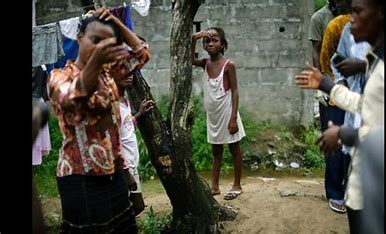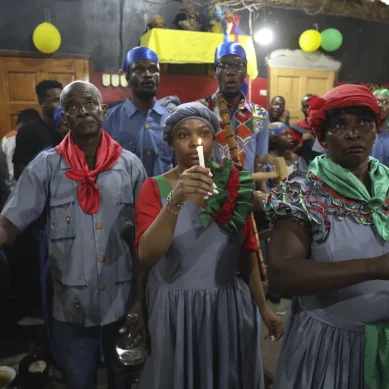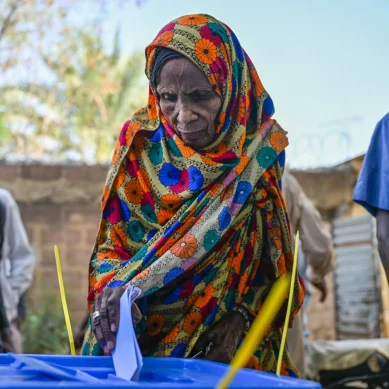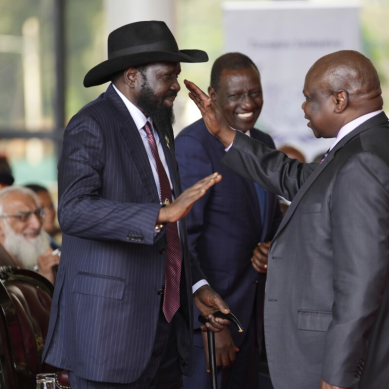
Despite informing investigators about the World Health Organization (WHO) worker who gave up her a job in exchange for sex, the woman told The New Humanitarian in February that she still hadn’t received any assistance. The woman said her fiancé ended their relationship once he found out about the abuse. She said she winces every time she sees a WHO logo on a vehicle.
It is a refrain that cuts across allegations of sex abuse by WHO staff.
“They said they’d help us with psychosocial support. We haven’t seen it. They said they will bring financial support. We haven’t seen it.”
Of the 83 cases noted by the independent commission, 23 were found to be associated with WHO personnel, Gaya Gamhewage said, adding that the remainder of allegations were against other UN agencies and humanitarian agencies.
Gamhewage, who was appointed in 2021 to lead WHO’s sex abuse prevention efforts made the remarks at a February 28 news conference.
Nearly 70 per cent of the women interviewed by The New Humanitarian said they were abused or exploited by men who said they worked for WHO. Gamhewage said WHO’s investigations showed some men were posing as WHO workers, and others worked for different aid organisations.
Asked if she was frustrated by any aspect of WHO’s response to the scandal, Gamhewage told The New Humanitarian in an interview in September: “No. When I look at what other agencies are doing and what I’ve been able to do, it’s incredible.”
Upon her appointment, Gamhewage urged the UN health body to be “courageous” in implementing widespread reforms. Those have included efforts to speed up investigations and appointing new investigative staff to help clear a backlog of global cases. Gamhewage said it was possible some victims still had not been reached.
Despite recommendations from the independent commission, WHO has said repeatedly that UN rules prohibit paying reparations. The UN itself, however, has called for reparations to be made in cases of human rights violations and conflict-related sexual violence.
Some organisations, like the Catholic Church, have sold off assets to pay reparations to victims of sexual abuse. Other groups found liable for abuses have been successfully sued for compensation and damages.
Temporary contract workers – as many women abused in the Ebola sexual abuse scandal were – lack access to the full extent of UN justice mechanisms. UN staff, by contrast, have been awarded settlements of more than $100,000.
“I needed work so that my life could continue, so that I could buy myself a parcel to live on – to build a place I could call my own home,” the woman with the two-year-old daughter told The New Humanitarian on 21 September.
She said she was impregnated by a man who said he worked for WHO and offered her a job in exchange for sex. He later blocked her number and refused to hire her. She said she eventually had a miscarriage. Another man then offered her a job working for WHO in exchange for sex, she said, adding that after she submitted, she was hired.
At that time, she had received no assistance. In February, she said she had received her $250.
Arthur Nzanzu, who was in charge of the HEAL Africa project supporting survivors, told The New Humanitarian last month that it was merely an implementing partner and had no control over the project or how it was rolled out.
Nevertheless, he said the programme was constrained by budget limitations, time constraints and delays – all of which he linked back to UNFPA.
“This shouldn’t be treated like an ‘urgent project’ over a short time. It should be a long-term project that spans two years or even three years.”
Some of those delays occurred because UNFPA wanted to vet the eligibility of potential beneficiaries of the project, Nzanzu said. UNFPA said an initial list came as a result of its work with victims in target regions.
HEAL Africa had been given an initial database of women by UNFPA who were then informed by HEAL Africa that they would receive support, but Nzanzu said UNFPA then told his organisation to stop and provided them with an entirely new database.
UNFPA said if anything, even more victims – 104 as opposed to 92 – were given assistance.
“The big problem was, when we started looking for the people who were listed in this new database, it took time, and we could only find a few of them,” Nzanzu told The New Humanitarian in a telephone interview.
Others on the initial database already promised assistance by HEAL Africa then had to be told they weren’t eligible, Nzanzu said, adding that they were “furious”. UNFPA had no immediate response to this claim at the time of publication.
HEAL Africa began working on the project in April of 2022. It concluded its operations in December.
“Honestly, the budget was really very small,” Nzanzu said, explaining that the nine-month project received roughly $65,000 of funding, which gave the organisation about $7,000 to work with each month.
“When they bring such a small amount of money… this shouldn’t be treated like an ‘urgent project’ [over] a short time period,” he said. “It should be a long-term project that spans two years or even three years.”
He said 104 women received support – but many only in recent months. The New Humanitarian alerted WHO to reported delays in September.
UNFPA said the emphasis was being placed on psychosocial support and reintegrating the women to help them become autonomous. The women have the option to reopen cases if they choose, however, “victim assistance is not provided in perpetuity”, the agency added.
Gamhewage reiterated the phrase “justice delayed is justice denied” at the 28 February news conference in Geneva, noting that the UN’s Office of Internal Oversight Services (OIOS) was still conducting its investigations into the allegations.
Part of that work was to determine if any cases could be referred to the Congolese authorities for possible criminal prosecution. One of the nine rapes cited by the independent commission was that of a 13-year-old.
While roughly half of the victims had been reached to offer legal assistance, the other half had not, said Gamhewage, citing difficulties in locating the victims. Gamhewage pointed to other challenges in rolling out the victims’ assistance programmes, including difficulties in reconciling the names of some of the women. She said some had given false names to investigators. Telephone numbers also changed.
Gamhewage said 13 victims are pursuing legal actions, but she had no other information on what the cases involved or which organisation the alleged perpetrators worked for.
WHO also said it hasn’t been informed of any legal proceedings involving paternity claims against WHO personnel. Several victims told The New Humanitarian they had been impregnated by men claiming to work for WHO.
“Part of the investigations currently being conducted by UN OIOS is also to follow up on paternity claims and to facilitate processing of such claims, including DNA testing,” according to WHO spokesperson Fadéla Chaib.
- The New Humanitarian report











